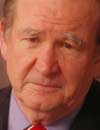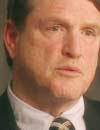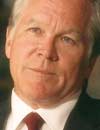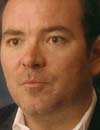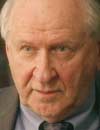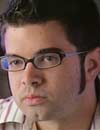- Patrick Buchanan
Commentator; former adviser to President Nixon - Len Downie
Editor, The Washington Post - Lauren Rich Fine
Managing director, Merrill Lynch - John Hinderaker
Blogger, Power Line - Jeff Jarvis
Blogger, BuzzMachine - Scott Johnson
Blogger, Power Line - Bill Keller
Editor, The New York Times - Josh Marshall
Blogger, Talking Points Memo - Mark McKinnon
Former media adviser to President Bush - Craig Newmark
Founder, craigslist - Jay Rosen
Blogger; Professor, New York University - William Safire
Columnist, The New York Times - Josh Wolf
Blogger, The Revolution Will Be Televised
I'm talking about conservative commentators. But sure they do. I think [there] is an honorable role in journalism for objective, straight newsreporting.
What? Objective, straight news reporting? Where do you get that?
... My argument about the media is, look, be one or the other. I've always been a commentator, a columnist and opinion writer. I'm not a straight newsreporter. But these other fellows that move from one to another to another -- one day you see them on the editorial page; the next day, they're on the front page with the lead news story. That's always bothered me more than the people who were up front and had their cards on the table.
Are you saying that the correspondents and reporters on Fox News are objective news reporters?
I'm sure some of them are. I think they are objective. Yeah, they're objective news reporters. But there's no doubt that many of them are looking for stories that interest a conservative audience. Washington Times is a conservative paper; Washington Post is a liberal paper. I read them both every day.
I know, but you made reference to an objective news reporter. We're looking for an objective news reporter. Given your experience, where is he?
The animal still exists. I think you find a number, for example, covering the war. Sure, there's a lot of objective coverage there, sure.
In The New York Times?
Sure. I think John Burns is an outstanding reporter, does a great job.
So not everybody in the establishment media is a biased reporter, slanted news.
... Let me give you an example. [New York Times reporter] James Bennet is going to [become editor of The Atlantic] magazine. He covered my campaign, and when he first showed up in Louisiana, I looked at him. I said, "This fellow looks like Lenin." (Laughs.) He had a beard and [was] this bald-headed young guy. But his coverage of my campaign was as objective and fair and exhaustive -- he made every effort to understand all my ideas about economics and trade. And he did a piece in The New York Times -- it was one of the best pieces I've ever seen in terms of condensing and explaining and presenting clearly, comprehensibly and I think persuasively exactly what I believed. ...
No. "Objective" is not a good term, because nobody's objective. We're all human beings. If I said that the tie that you're wearing right now was maroon, you might say it's dark red, and we could both be correct; there's no objective way of describing the color of your tie.
Instead, there's a fair way of describing your tie: I cannot say that your tie is full of spots, it is dirty and should have been laundered a long time ago, because that wouldn't be fair. That wouldn't be accurate, and it wouldn't be fair. So we try to be accurate and fair as best we can every day. And we make mistakes, and we correct them the next day.
So if someone says that you are a biased organization, or liberal?
No. ... Unbiased and objective are two different things. "Biased" means I would go into editing a story wanting it to come out pro-Democrat or pro-Republican, liberal or conservative, whereas "objective" would mean that I have absolutely an empty mind while editing stories, and that's not true.
When you do surveys, you find a lot of people who say just what you want: They want an investigative piece to come to a conclusion, to say what ought to be done, to have some kind of impact. But we're trained not to do that. That's not being objective.
But historically newspapers weren't objective. Historically they were all family-owned or locally owned, and that was why they existed, was to be very opinionated. It's why you had two newspapers in every town, to make sure you were getting both sides of an event or something going on. That's what some of the industry has lost, and I don't think that was because of Wall Street. It might be, but I don't know.
I'm kind of old-fashioned in this regard. I think of it as a very honorable profession, a very important profession. I think that the traditional ideal of objectively and neutrality is very important, and I part company here with some of my good friends on the Web who think that everybody's got bias and you should forget about objectively and just tell people what your biases are and fight it out. ...
There's always subjectivity. Every time you pick up a pen and start to write, with the first word you're making judgment calls; you're making decisions; you're making subjective judgments about what story to write, what not to write, how to write the story. I understand that. But that doesn't mean that objectivity can't be an important ideal, an important goal, even if it's not perfectly realized.
So I do think there is a unique role for the press, not because they're constitutionally privileged, but because they've got the resources, because it's their job to go out and gather the news and report the news. I'd like to see that function carried out in as fair and neutral and objective a way as possible. From that point on, then I'd say let the commentators have at it, slug it out over the meaning of the news, the meaning of the facts, the importance of what was published in the newspapers that morning. ...
Well, I think this is a silly narrative. It's just like journalism to try to make a fight where one doesn't have to exist. ... My problem with journalism is that it's too long been separate. My friend [media critic and blogger] Jay Rosen at New York University makes that point, that a lot of things that journalists do to be separate from the public they serve, they say they're objective, "I don't vote; I'm professional." ...
That's a lie of omission. … It says that somehow, "I'm different from all the rest of you; I don't have opinions." Well, of course you have opinions; you're human. By not telling us what those are, by not being transparent about that, you're not trusting us to be able to then judge what you say on the basis of its quality. ...
I grew up with the standard of this ethic of objectivity; I now have been taught by the blogosphere an ethic of transparency. ... A good journalist will still do an intellectually honest job and tell us the facts completely and fairly, whether or not it backs up the opinion they happen to have, and we will judge their veracity and their credibility as a reporter as a result. Instead, what happens in American journalism is that we guess what the hidden agendas are, and that's not healthy for us. That leads to gotcha moments in journalism. ...
Is objectivity possible?
... I think that the criterion is fairness. It is certainly possible for people writing about public affairs to be fair. I hold myself to that standard, and I hold those of us who write for the site to that standard. Are we being fair?
What does fair mean? At the least, with respect to questions of public policy, it means do you accurately represent the views of people who disagree with you? And when you criticize them, are you criticizing something that is an accurate account of the views that you oppose? In that sense, I think it's certainly possible to be fair, if not objective. That's what I look for in journalists. Are they giving me enough information for me to make up my own mind, or are they trying to make up my mind for me?
Fairness allows a reader to make up his or her own mind. That's what I try to do when I'm writing on our site by linking to other people whose work I may be disagreeing with or that I may be offering in support of my own views: make it possible for readers to look over my shoulder and disagree with me if I'm wrong, or call me to account if I'm being unfair. ...
The idea that we are partisan on anybody's behalf is just wrong. Just as judges or schoolteachers or military officers have personal views of their own but are expected to perform their duties in a responsible and impartial fashion, that's what we expect of our journalists, too. I don't really care whether somebody on my staff believes in gay marriage or the estate tax. ... Our job is not to tell people what to think; it's to give them the information they need to make up their own minds. ...
... When people talk about objective journalism, you're saying that there really isn't any function to he said/she said journalism. You've got to take a stand is what you're saying.
I would say this: There's a lot to be said for the canons of journalistic objectivity. However, I think that it has become derailed in recent years to the point where you have cases where Person A is saying something that, as near as we can figure out as human beings, today is really true. ... And journalists take what Person A is saying and say, "Well, we've got to get Person B's opinion, too, to have balance." There are many cases where the person running the story knows that Person A is telling the truth and Person B is lying, but to maintain objectivity, they are placed on equal footing, even though one's true and one is not true. I think that is not honest journalism. I don't think that is really informing people. ...
I mean, philosophically, what you're saying is that you believe there's an objective truth out there that should dominate editorial policy, and you don't have to just throw in all the other information that doesn't really challenge substantially that objective truth.
I believe in facts. I think that as imperfect human beings, we don't always know what the facts are. But the way we organize our whole society, our science, our technology, whatever, is based on trying things out, finding out certain things are true and certain things are not true. I think that those basic judgments should inform journalism much more than they do. ...
So you don't accept the idea that there is a professional form of journalism that attempts to be objective.
I think everybody tries to be objective, but what's objective? Everybody has their own idea of what the truth is. ...
I'll just run a standard definition: presenting both sides of the story. I think most journalists try and do that. Why do you need to get around this filter if it's going to present both sides of the story?
Because both sides do it differently. Everybody presents their own side and their own versions of what both sides are. ...
One of the innovations of journalism over the last century was the idea of objectivity, and that's failed now. Dan Gillmor has a great essay on that. The idea is what we want is fairness, because the current model of objectivity means things like on TV, when you have a story, you show one person on one side and another person on the other side. That's good in theory, but there are times when ... you talk to the reporter afterward, [and] they'll admit, sure, they know that one of these guys is a liar and what he's saying is just complete nonsense, but in the current vision of objectivity, they have to give equal weight to the guy that they know is lying. That's broken. ...
What American journalists actually mean when they say "objectivity" is about 12 or 15 different things, but they're all similar. It's the idea of neutrality. It's the idea of backing up and being detached. It's the idea of not choosing sides. It's an idea of getting all perspectives. But it's also [that] we're professionals, and we're kind of trained not to react. It's caught up with the idea of being a crap detector and being a good skeptic. But fundamentally, objectivity in the American journalism was a way of generating trust and maintaining [it] over time in a particular group of people and their practices. ... But it is, in many ways, breaking down. ...
You don't subscribe to, let's say, [Washington Post op-ed columnist] Michael Kinsley's recent remarks that there is no real objective journalism and that, in fact, inserting opinion into journalism gives you better reporting, better information.
He's brilliant, and he can be brilliantly mistaken. I think you should strive, if you are a straight reporter and if you are fulfilling the role of trying to inform people of what's happening, what event are you covering and tell it straight. You don't always do it, but you should always try to do it, and let the commentators comment. ...
... You define yourself as a political journal, a journalist of opinion.
I define myself as a transparent journalist in that my biases are on the table. I don't make any attempts to achieve a false objectivity, because I feel that trying to do that on issues that you actually have an opinion about is actually not genuine at all. I feel that you will put yourself in a situation of either overcompensating and being an advocate against what you believe in, or you will do the opposite and suddenly force the issues in a sort of undercover advocacy role, in terms of your inflection about the protesters or something like that.
I think this happens all the time on corporate newscasts. I feel that it's more up front, it's more truthful, to put my views on the table, so that you can say, "Well, yes, this is his report, but he believes this, so we have to take that into account." I think that the viewer is sophisticated enough to see my bias and then take away my bias from my reporting and get a more truthful impression than going in thinking that everything the newscaster is saying is not motivated by advertising budgets and that sort of thing.
We interviewed Pat Buchanan, a conservative Nixon era official, who said that that's exactly his criticism of Walter Cronkite at the time; that he was a liberal, but he hid his liberalism in false objectivity.
Right. I think that that's the strongest problem with objective or nonpartisan news gathering, is that there always is a bias, whether it's the bias of your editor, your own bias, or even middle management's bias that's like, "Well, we're doing this report about United Defense, and we know that they provide a lot of advertising budget through other companies [they're] involved in, so we don't want to be critical of this organization, so, you know, you went a little too far there." There's been countless cases of situations where editors have said, "You can't go this far in this story because it would be detrimental to our advertising budget."
And if Walter Cronkite says to us that "I'm proud to be a liberal, but when I do my job, I get my opinions, to the extent that I can, out of it and present the information with both sides of the story in a balanced way," you don't believe that.
To say that he does it I think is taking it too far. To say, "I strive to be balanced, but I am liberal, and you have to realize that that is going to have some bearing, and I try to make it as little as possible; I'd like you to point out when you think that my own opinion is taking over," I think that's legitimate. But to say, "When I'm on the clock, I'm on the clock, and my politics are out the window" -- we're human beings; we can't turn off our mental capacity to feel about issues.
... I feel that [what I do is] very close to objective, but I feel that my editing decisions are colored by my politics. I think that's a fact that we all need to confront and realize, and the people that are up front about it are going to lead the way for mainstream media to go: "Disclaimer: I voted for this guy. However, this is what just happened to him."
Transparent journalism has a lot more ability to gain true trust with its viewers than those striving for objective journalism. I was watching Fox News' coverage of Israel and the Lebanon struggle while I was incarcerated, and it was very clear. They're like: "Yeah, the terrorist Hezbollah is getting trounced by Israel. Isn't this wonderful?" And I'm like, I don't care which side you're falling on; this isn't objective. There's clearly ... the good guys and the bad guys in your reportage, and you're pretending that you're fair and balanced. ...
![News War [site home page]](../art/p_title.gif)








